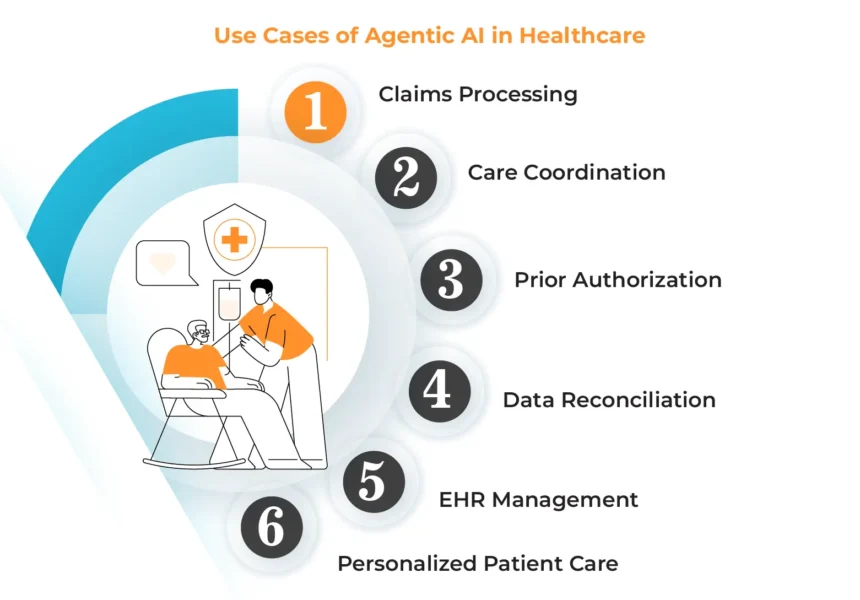In September 2024, Harvard Medical School’s agentic AI system, TxGNN, made headlines by autonomously identifying potential treatments for over 17,000 diseases, including many without prior therapeutic options. By analyzing vast medical data and uncovering hidden links between diseases and medications, it proposed viable treatments for rare conditions it had never seen before—complete with detailed explanations.
This breakthrough highlights how agentic AI is transforming healthcare from reactive diagnostics to proactive, autonomous partners in patient care. Unlike traditional AI, agentic systems independently reason, plan, and execute complex medical tasks, revolutionizing drug discovery and personalized treatments for greater efficiency and accuracy.
The emergence of agentic AI represents a major upheaval from reactive to proactive healthcare systems. Unlike traditional AI that responds to specific queries, agentic AI systems can independently reason, plan, and execute complex medical tasks. They don’t just analyze data; they actively pursue solutions, coordinate care, and adapt their strategies based on evolving patient needs. This autonomous capability is transforming everything from drug discovery to personalized treatment plans, making healthcare more efficient, accurate, and accessible than ever before.
The Role of Agentic AI in Healthcare
Agentic AI is a sophisticated branch of artificial intelligence that can independently carry out complex tasks, make informed decisions, and continuously improve through learning. When it comes to healthcare, its role is transformative—enabling more accurate diagnoses, personalized treatments, and streamlined administrative workflows. Below are several key ways in which agentic AI is revolutionizing healthcare operations:
Advancing Healthcare Software Development
In medical research, agentic AI plays a crucial role by accelerating the discovery of new treatments and therapies. Through custom healthcare software development, AI-powered systems are designed specifically to analyze extensive datasets, identify potential drug candidates, predict their efficacy, and recommend optimal clinical trial designs.
By leveraging these tailored software solutions, healthcare organizations can easily shorten or cut down the time it takes to come up with new medications, addressing critical healthcare challenges more efficiently and driving innovation in the industry.
Enhancing Clinical Decision-Making
Agentic AI plays a pivotal role in augmenting clinical decision-making by processing extensive medical data, including EHRs, diagnostic reports, and imaging scans, to deliver intelligent, data-driven suggestions.
These AI-powered agents can uncover subtle patterns and correlations that might go unnoticed by human providers, thereby enabling more precise diagnoses and tailored treatment strategies. This becomes especially crucial in intricate medical scenarios where rapid, informed decisions can significantly impact patient outcomes.
Improving Patient Engagement
Through the integration of conversational AI agents, healthcare providers can offer patients more interactive and personalized experiences. These agents can handle appointment scheduling, medication reminders, and follow-up communications, ensuring that patients remain informed and engaged in their care.
Agentic AI enhances the dynamic between healthcare providers and patients by delivering timely, context-aware insights, encouraging shared decision-making and contributing to improved health outcomes.
Streamlining Administrative Processes
Routine administrative duties like billing, claims handling, and managing patient flow can be time-consuming and resource-intensive. Agentic AI streamlines these operations by automating repetitive processes, minimizing human error, and allowing healthcare staff to concentrate on higher-value, patient-focused tasks.
For example, AI agents can process insurance claims by verifying patient information, checking policy details, and submitting claims—all without human intervention. This automation enhances efficiency and improves the accuracy and speed of administrative operations.
Enhancing Medical Imaging and Diagnostics
Agentic AI systems excel at interpreting complex medical images like MRIs, X-rays, and CT scans with high precision. By autonomously detecting anomalies and classifying findings, these AI agents enable radiologists to make faster and more accurate diagnoses.
This reduces diagnostic errors and enables earlier interventions, which can be critical for conditions like cancer and cardiovascular diseases.
Optimizing Hospital Resource Management
Agentic AI can dynamically manage hospital resources, including staff scheduling, bed allocation, and equipment usage. By forecasting patient inflows and treatment durations, AI agents help healthcare facilities optimize capacity and reduce wait times.
This leads to seamless operations and improved patient satisfaction, especially during periods of high demand or emergencies.
Supporting Remote and Telehealth Services
Agentic AI empowers telehealth platforms by providing real-time monitoring, symptom checking, and preliminary diagnostics remotely. These AI agents can triage patients, recommend appropriate care pathways, and escalate urgent cases to clinicians.
This enhances access to quality healthcare in underserved or rural areas, making care delivery more equitable and scalable.
Challenges and Considerations in Agentic AI Implementation
Despite the promising applications, the integration of agentic AI in healthcare presents several challenges:
- Data Privacy and Security: Managing sensitive patient information necessitates strict security measures to safeguard against breaches and maintain compliance with regulations like HIPAA.
- Regulatory Approval: AI systems must undergo rigorous testing and obtain necessary approvals before being implemented in clinical settings to ensure their safety and efficacy.
- Human Oversight: While AI can assist in decision-making, human judgment remains crucial, particularly in complex or ambiguous cases.
- Bias and Fairness: AI systems must be trained on diverse datasets to avoid biases that could lead to disparities in care.
Future of Healthcare with Autonomous AI
The future of healthcare is being reshaped by the rise of agentic AI, promising a shift from reactive care to proactive, personalized interventions. As these intelligent systems evolve, they will not only support but also autonomously drive critical decisions, monitoring patient data in real-time, adjusting treatment plans, and even predicting health crises before they occur. Integration with remote monitoring tools and wearable devices will enable continuous, round-the-clock care beyond traditional clinical settings.
Moreover, agentic AI will streamline administrative workflows, reduce clinician burnout, and enhance resource allocation. As this technology matures and becomes more deeply embedded into various healthcare software solutions, it will pave the way for a smarter, more efficient, and truly patient-centric healthcare ecosystem. The widespread adoption of agentic AI in healthcare holds the potential to redefine how care is delivered, making it more adaptive, responsive, and equitable for all.
Overall, agentic AI is not merely a tool but a transformative force in modern medicine, reshaping how care is delivered and experienced. What distinguishes it from conventional AI is its capacity for autonomous operation, contextual understanding, and ongoing learning. As regulatory frameworks evolve and adoption accelerates, agentic AI will become a foundational pillar in the future of global healthcare delivery.


